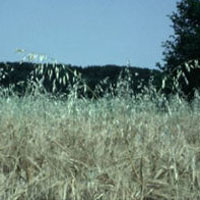Search Healthnotes
Oats
 © Steven Foster
© Steven FosterParts Used & Where Grown
The common oat used in herbal supplements and foods is derived from cultivated sources. For some herbal supplements, the green or rapidly dried aerial parts of the plant are harvested just before reaching full flower. Many herbal texts refer to using the fruits (seeds) or green tops. Although some herb texts discuss oat straw, there is little medicinal action in this part of the plant.
- Reliable and relatively consistent scientific data showing a substantial health benefit.
- Contradictory, insufficient, or preliminary studies suggesting a health benefit or minimal health benefit.
- For an herb, supported by traditional use but minimal or no scientific evidence. For a supplement, little scientific support.
Our proprietary “Star-Rating” system was developed to help you easily understand the amount of scientific support behind each supplement in relation to a specific health condition. While there is no way to predict whether a vitamin, mineral, or herb will successfully treat or prevent associated health conditions, our unique ratings tell you how well these supplements are understood by the medical community, and whether studies have found them to be effective for other people.
For over a decade, our team has combed through thousands of research articles published in reputable journals. To help you make educated decisions, and to better understand controversial or confusing supplements, our medical experts have digested the science into these three easy-to-follow ratings. We hope this provides you with a helpful resource to make informed decisions towards your health and well-being.
This supplement has been used in connection with the following health conditions:
| Used for | Amount | Why |
|---|---|---|
Anxiety | Refer to label instructions | Oats are part a group of “nerve tonic” (nervine) herbs used in traditional herbal medicine for people with anxiety, with few reports of toxicity.
|
Eczema | Refer to label instructions | Wild oats have been used historically to treat people with eczema. |
Nicotine Withdrawal | Refer to label instructions | Herbs used to treat anxiety are sometimes recommended as part of a smoking cessation program, including oat straw. |
Smoking Cessation | Refer to label instructions | as Oat Straw Taking oat straw, which is commonly used to treat anxiety, has been shown to significantly reduce the number of cigarettes smoked per day. |
Traditional Use (May Not Be Supported by Scientific Studies)
In folk medicine, oats are used by herbalists to treat nervous exhaustion, insomnia, and “weakness of the nerves.” A tea made from oats was thought by herbalists to be useful in rheumatic conditions and to treat water retention. A tincture of the green tops of oats was also used to help with withdrawal from tobacco addiction.1 Oats were often used in baths to treat insomnia and anxiety as well as a variety of skin conditions, including burns and eczema.
Copyright © 2026 TraceGains, Inc. All rights reserved.
Learn more about TraceGains, the company.
The information presented by TraceGains is for informational purposes only. It is based on scientific studies (human, animal, or in vitro), clinical experience, or traditional usage as cited in each article. The results reported may not necessarily occur in all individuals. Self-treatment is not recommended for life-threatening conditions that require medical treatment under a doctor's care. For many of the conditions discussed, treatment with prescription or over the counter medication is also available. Consult your doctor, practitioner, and/or pharmacist for any health problem and before using any supplements or before making any changes in prescribed medications. Information expires December 2026.









